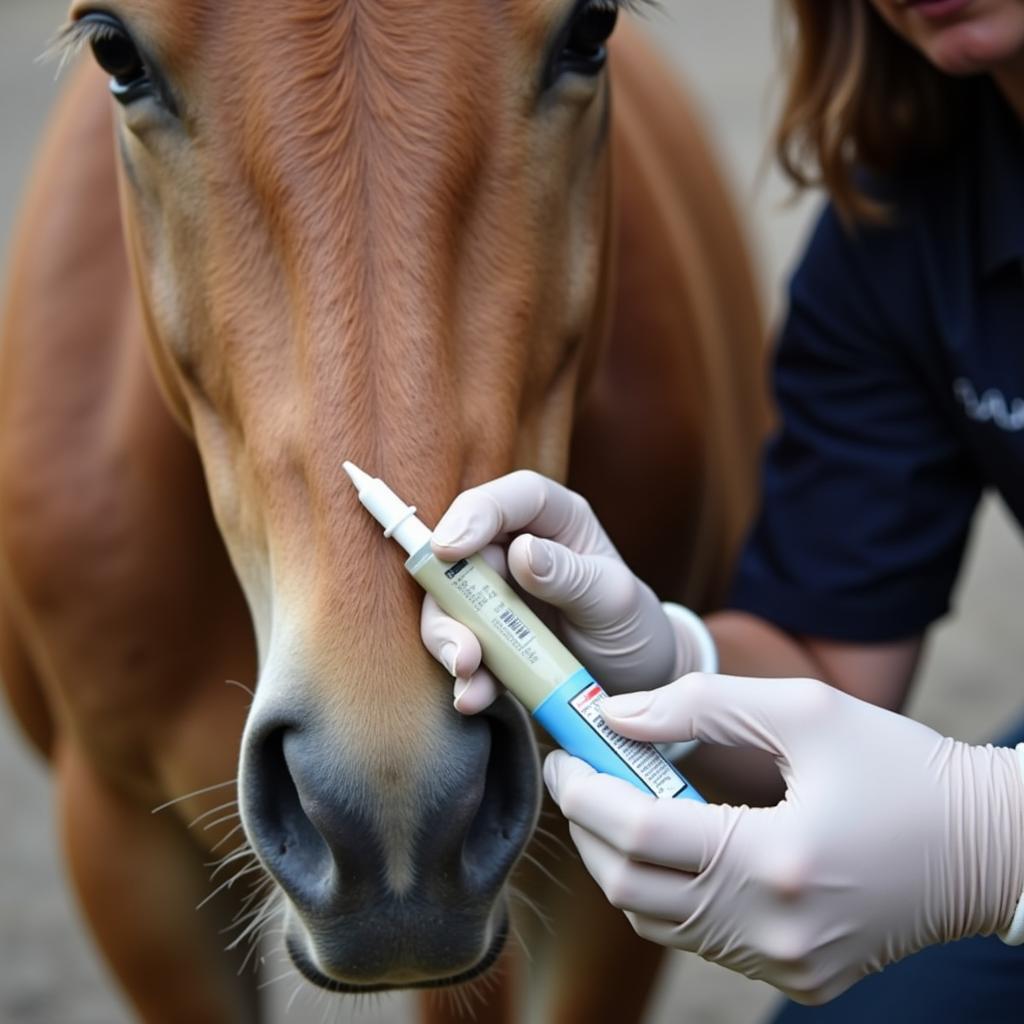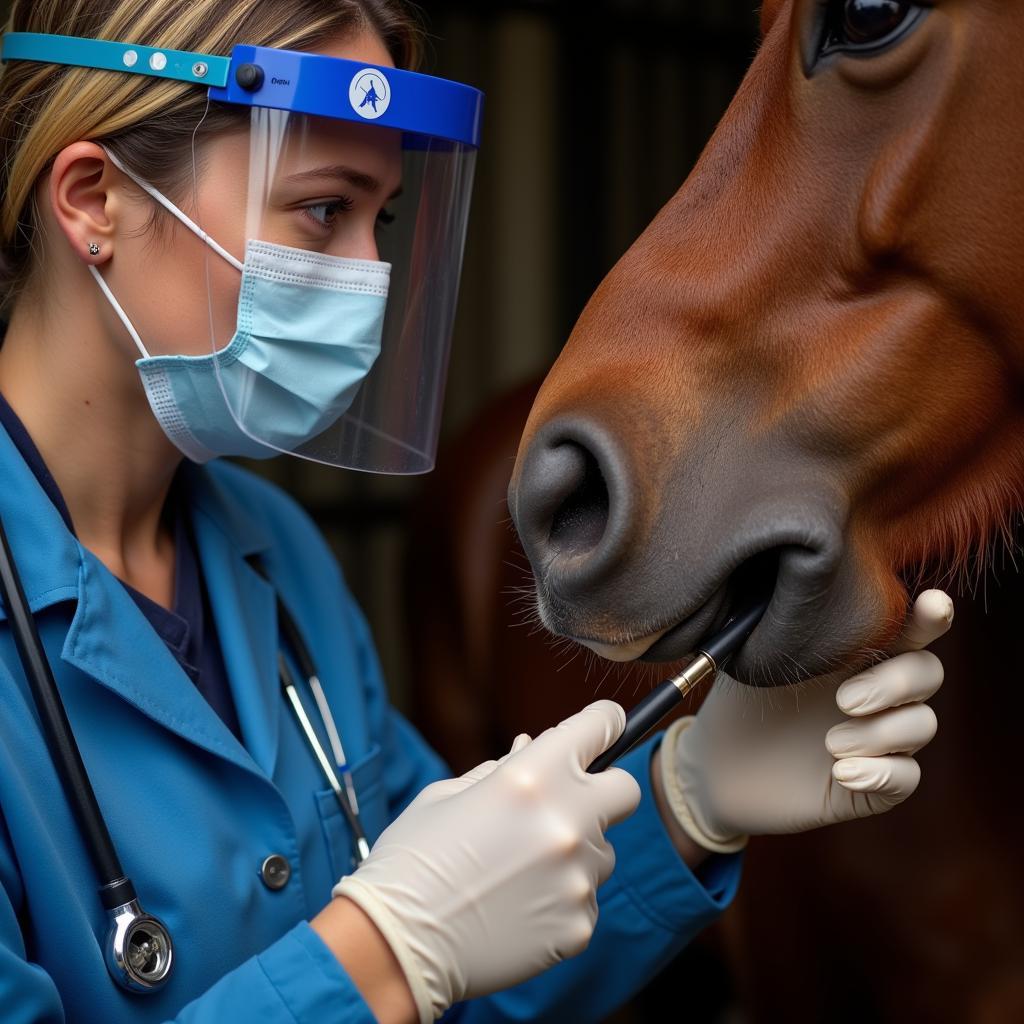Omeprazole Dosage For Horses is a crucial aspect of equine health management, especially for horses suffering from gastric ulcers. Accurately determining the right dosage is vital for effective treatment and preventing potential complications. This article delves into the intricacies of omeprazole administration in horses, providing horse owners with the necessary knowledge to ensure their equine companions receive optimal care.
Administering the correct omeprazole dosage for horses is crucial for effectively managing equine gastric ulcers. Understanding the factors influencing dosage and recognizing potential side effects is paramount for responsible horse ownership.  Horse Receiving Omeprazole Treatment
Horse Receiving Omeprazole Treatment
Factors Influencing Omeprazole Dosage for Horses
Several factors can influence the appropriate omeprazole dosage for horses, including the horse’s weight, the severity of the ulcers, and the formulation of the medication. It’s essential to consult with a veterinarian to determine the individualized dosage regimen for your horse. Don’t rely on generic recommendations; professional guidance is key.
Weight and Severity of Ulcers
A horse’s weight plays a significant role in determining the appropriate omeprazole dosage. Heavier horses generally require higher doses. Similarly, the severity of the ulcers can also affect the prescribed dosage. More severe ulcerations may necessitate a higher or more frequent administration of the medication.  Veterinarian Examining Horse for Ulcers
Veterinarian Examining Horse for Ulcers
Omeprazole Formulation
Omeprazole is available in various formulations, including paste, granules, and injectable solutions. Each formulation has specific dosage recommendations. For instance, omeprazole for horses dosage in paste form might differ from the dosage of granules. Understanding these differences is crucial for accurate administration.
Common Omeprazole Dosages for Horses
While individualized dosages are essential, there are some common dosage ranges for omeprazole in horses. For the treatment of gastric ulcers, the typical dose is 0.7-1.4 mg/kg once daily. However, this can vary depending on the individual horse’s needs and the veterinarian’s assessment. bulk omeprazole for horses can be a cost-effective option for horse owners who need to treat multiple horses or administer the medication long-term.
How often should I give my horse omeprazole?
Typically, omeprazole is administered once daily for the treatment of gastric ulcers in horses. However, in some cases, more frequent administration might be necessary. Always consult with your veterinarian for specific instructions.
Can I give my horse omeprazole for diarrhea?
Omeprazole is not typically used to treat diarrhea in horses. If your horse is experiencing chronic diarrhea in horses, it’s essential to consult a veterinarian to determine the underlying cause and appropriate treatment. Another medication, sucralfate in horses, may be more appropriate for certain digestive issues.
Potential Side Effects of Omeprazole in Horses
While generally safe, omeprazole can occasionally cause side effects in horses. These side effects are typically mild and transient, but it’s important to be aware of them. Common side effects include diarrhea, loss of appetite, and changes in behavior.
“It’s crucial to monitor your horse closely for any unusual signs after starting omeprazole,” advises Dr. Emily Carter, DVM, specializing in Equine Gastroenterology. “While rare, some horses can develop more serious adverse reactions, requiring immediate veterinary attention.”
Conclusion
Understanding the proper omeprazole dosage for horses is essential for effective ulcer management. Always consult your veterinarian for an individualized dosage plan and monitor your horse closely for any potential side effects. Proper medication administration, combined with appropriate management practices, can significantly improve your horse’s comfort and overall well-being. Remember, accurate omeprazole dosage is just one piece of the puzzle in maintaining optimal equine health.
FAQs
- What is the typical omeprazole dosage for horses?
- What are the potential side effects of omeprazole in horses?
- How is omeprazole administered to horses?
- How long should a horse be on omeprazole?
- Can I give my horse over-the-counter omeprazole?
- What should I do if my horse experiences side effects from omeprazole?
- How can I prevent gastric ulcers in my horse?
You might also be interested in our article about lunge rope horses.
Need more assistance? Contact us at Phone Number: 0772127271, Email: [email protected] or visit our address: QGM2+WX2, Vị Trung, Vị Thuỷ, Hậu Giang, Việt Nam. We have a 24/7 customer service team.